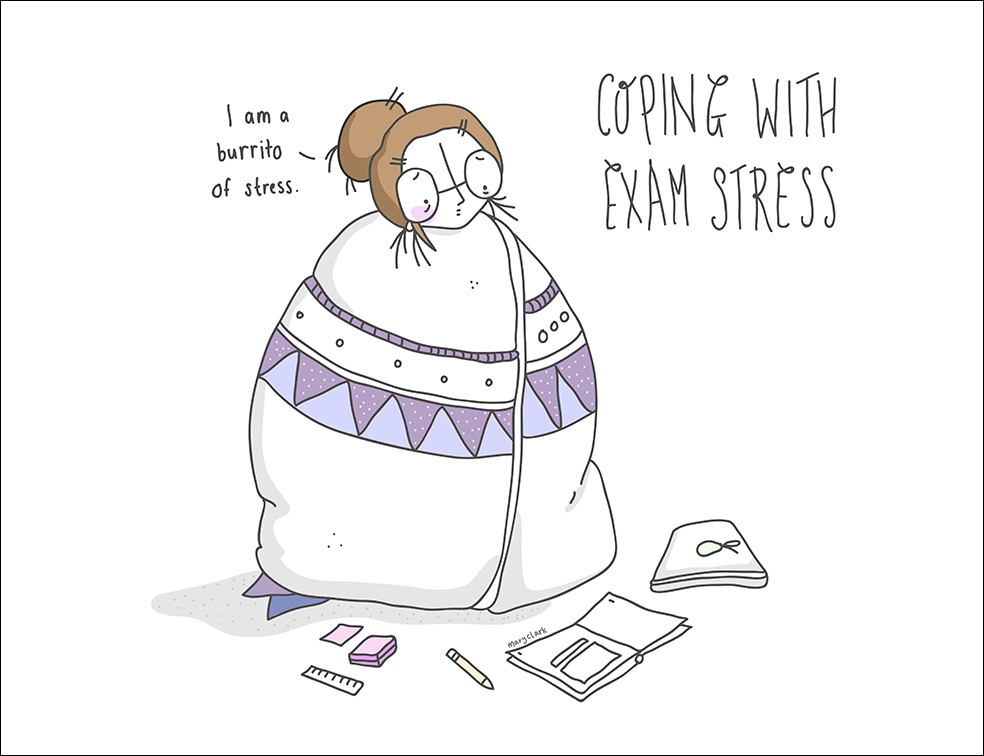Despite studying hard for weeks, a young student named Alex feels a wave of panic as soon as the test paper lands on the desk. The room feels suddenly too warm, Alex’s hands become clammy, and the questions on the page start to blur. This isn’t just about being a little nervous; it’s a vivid example of how test anxiety can deeply affect a student’s ability to perform.
Math & ELA | PreK To Grade 5
Kids see fun.
You see real learning outcomes.
Watch your kids fall in love with math & reading through our scientifically designed curriculum.
Parents, try for free Teachers, use for free
In this blog, we’ll explore how to cope with test anxiety, a challenge that many students like Alex face, and provide strategies to manage and overcome these overwhelming feelings.
Psychological and Physiological Aspects of Test Anxiety
From a psychological perspective, test anxiety can lead to negative thoughts and fear of failure, making it hard for students to concentrate or recall information during tests. Physiologically, it might manifest as symptoms like stomachaches, headaches, or a racing heart, further distracting from focusing on the test.
Why Understanding Test Anxiety is Crucial?
Understanding test anxiety is crucial for parents, teachers, and students because:
- recognizing the signs early on can lead to more effective ways to deal with test anxiety.
- knowing how to handle test anxiety can make a significant difference in their academic journey, providing them with the support and strategies they need to overcome these challenges and succeed.
5 Symptoms of Test Anxiety in Elementary Students
Understanding these symptoms is the first step in learning how to cope with test anxiety. Recognizing the signs early can help parents and teachers provide the right support to help students manage their anxiety effectively. Here are ways how test anxiety shows up:
1. Physical Symptoms: When kids get nervous for exams, their bodies often react noticeably. They might complain of stomachaches or headaches, common signs of stress. Some students might also experience excessive sweating or feel dizzy, which are clear indicators that the anxiety is not just in their minds but affects their whole body.
2. Emotional Symptoms: Test anxiety doesn’t just show up physically. Emotionally, students might feel fear, disappointment, or even anger towards themselves or the situation. These feelings can be overwhelming and make it hard for them to see their potential.
3. Behavioral Symptoms: One way to spot test anxiety in elementary students is by observing their behavior. Some might start avoiding school, especially on days when a test is scheduled, by pretending to be sick. This avoidance is a clear sign they’re struggling with the pressure of exams.
4. Cognitive Symptoms: Anxiety can cloud a student’s mind. They might find it hard to concentrate while studying or suddenly blank out during a test, even if they knew the material well the night before. Negative thoughts can take over, making it hard for them to focus on the task.
5. Performance Symptoms: Despite being well-prepared, test anxiety can lead to underperformance. This is one of the most frustrating aspects for students who have put in the effort but can’t show their true capabilities because of anxiety.
12 Ways to Help a Child With Test Anxiety
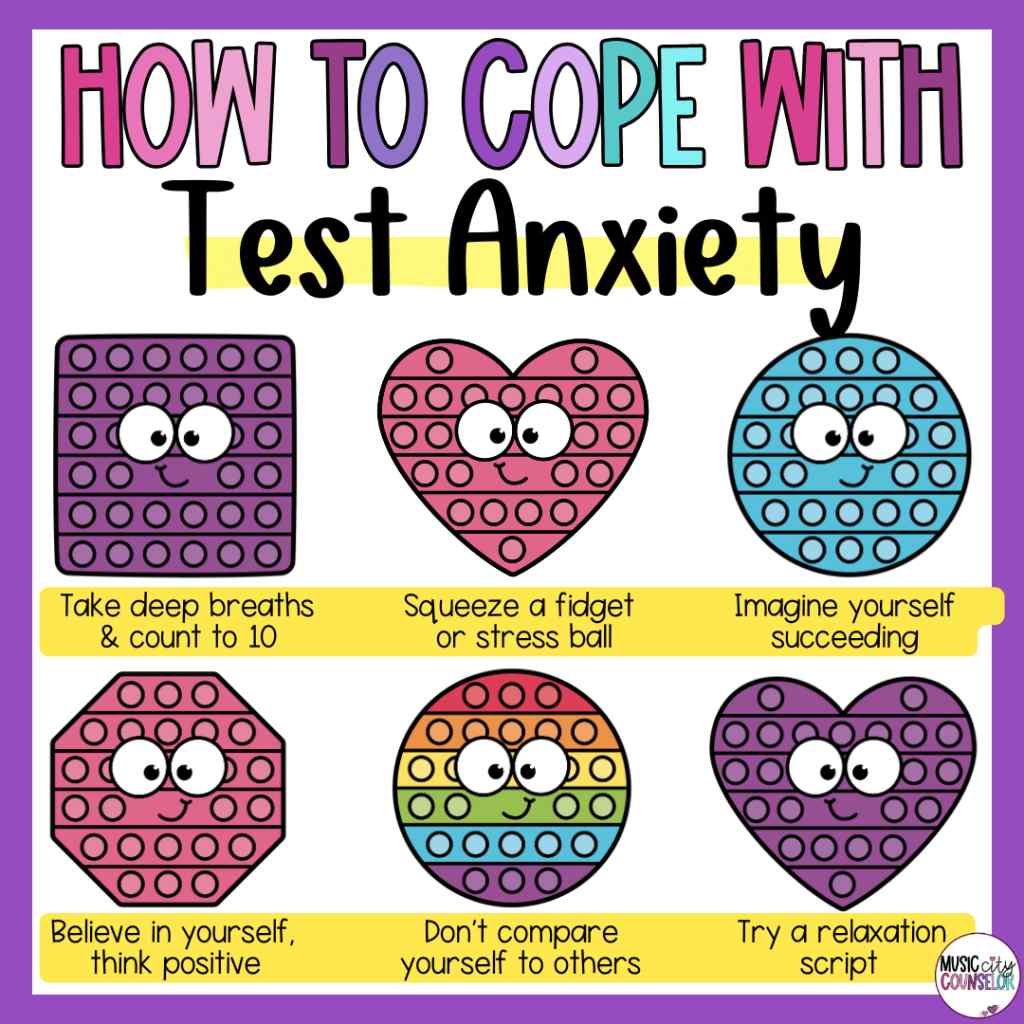
1. Encourage Open Communication
To combat test anxiety, it’s crucial to have open conversations with your child about how they feel when facing tests. Encourage them to express what exactly about the test makes them anxious. Is it the fear of not remembering the answers? Or perhaps the worry about the test’s outcome? This open line of communication can help them feel supported and understood.
2. Establish a Study Routine
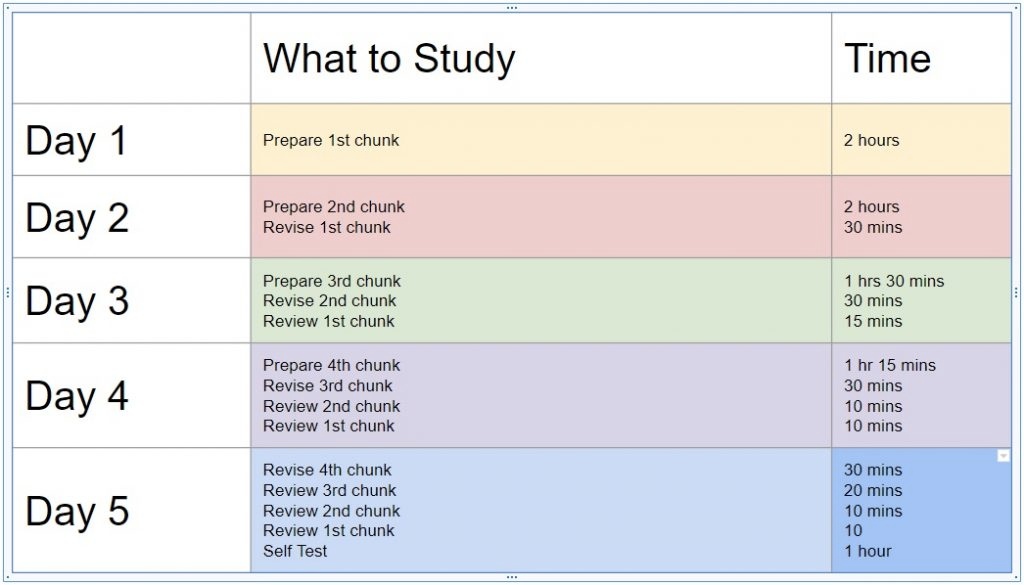
Creating a consistent study schedule can significantly reduce exam anxiety. Work with your child to break down their study material into smaller, more manageable parts and spread these out over time. This approach helps avoid the stress of last-minute cramming and builds confidence through gradual, steady progress.
Related Reading: How to Create After School Schedule for Kids
3. Promote Healthy Habits
A healthy lifestyle is a powerful tool to overcome test anxiety. Ensure your child gets plenty of sleep, eats nutritious meals, and engages in regular physical activity. These habits improve their physical well-being and enhance their mental and emotional resilience against stress.
Related Reading: Best Mental Health Activities for Kids
4. Teach Relaxation Techniques
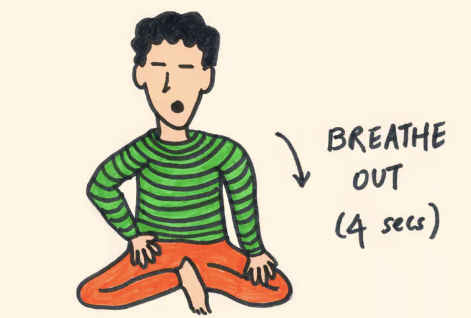
Introducing your child to relaxation techniques is a key test anxiety management strategy. Show them how to perform deep breathing exercises, guide them through simple meditation sessions, or enroll them in a yoga class suitable for their age.
These practices not only help in calming their mind and body but also in improving their focus. Regular practice can make a significant difference in how they respond to stress and anxiety, especially in a test setting.
Related Reading: Best Calming Strategies for Kids
5. Foster a Positive Mindset
Fostering a positive mindset is essential in combating test anxiety. Encourage your child to think positively about their abilities and the upcoming test. Discuss the importance of positive self-talk and help them replace negative thoughts with encouraging ones. This approach can significantly impact their confidence and reduce anxiety.
Related Reading: Best Hands-On Growth Mindset Activities for Kids
6. Simulate Test Conditions
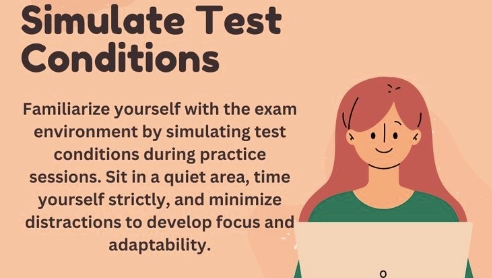
Simulating test conditions is an effective way to prepare your child and reduce their anxiety. Create a quiet, timed testing environment at home that mimics the actual test setting. This practice can familiarize them with the test format and conditions, making the real situation less intimidating. It’s a practical test anxiety strategy that can significantly boost their confidence and improve their performance on the test day.
7. Focus on Effort, Not Outcome
Praising your child’s effort into studying is a vital way to help them relax before a test. Recognize the time and dedication they invest in learning rather than fixating on the grades they achieve. This approach encourages a growth mindset, where the focus is on improvement and the learning process itself. It helps reduce the pressure they feel about needing to achieve perfect scores, thereby assisting in how to cope with test anxiety.
8. Provide Study Aids
Offering your child various study aids can significantly enhance their study sessions. Tools like flashcards, educational apps, or study guides tailor the learning experience to their needs, making it more engaging and effective. These resources can simplify complex topics, making it easier for your child to grasp and retain information. As a result, they feel more prepared and less anxious about upcoming tests.
Incorporating an educational platform like SplashLearn can be particularly beneficial in this context. SplashLearn offers a variety of interactive and engaging learning math and reading games and worksheets designed to make complex concepts more accessible and fun. Here’s how SplashLearn can be a great tool to manage test anxiety through learning and practicing concepts:
- Interactive Learning: SplashLearn provides interactive games that make learning engaging for children. This interactive approach can help maintain their interest and motivation in studying, which is crucial for long-term learning.
- Personalized Learning Paths: The platform adapts to each child’s learning pace and style, offering personalized learning paths to help strengthen their understanding of challenging subjects. This personalized approach ensures that children can work on their weak areas without feeling overwhelmed, reducing anxiety.
- Immediate Feedback: SplashLearn gives immediate feedback on the child’s performance, allowing them to understand their mistakes and learn from them right away. This instant feedback loop can help reduce the fear of failure and encourage a growth mindset.
- Practice Makes Perfect: With an extensive library of math and reading worksheets, SplashLearn allows children to practice as much as they need. This practice can build their confidence and proficiency in various subjects, making them feel more prepared for tests.
- Stress-Free Learning Environment: By turning learning into a game, SplashLearn creates a stress-free environment that can help reduce the anxiety associated with traditional study methods. Children can learn and practice at their own pace without the pressure of grades, which can significantly lower stress levels.
- Parental Involvement: SplashLearn also offers tools for parents to track their child’s progress, allowing for more effective support and encouragement. Knowing they are supported can help children feel more secure and less anxious.
9. Encourage Breaks
Regular breaks are essential for effective studying and test anxiety management. Encourage your child to take short breaks during their study sessions to prevent burnout and keep their mind fresh. These pauses can be a moment to stretch, have a snack, or do something they enjoy. Breaks help maintain focus and energy levels, making study time more productive and reducing the overwhelming feeling that can lead to test anxiety.
10. Review Test-Taking Strategies
Teaching your child effective test-taking strategies is a crucial step in helping them manage test anxiety. Show them how to approach different types of questions, such as multiple-choice or essay questions, and share tips on time management during a test. Understanding these techniques can significantly boost their confidence and efficiency, making the test experience less stressful and more manageable.
11. Seek Professional Help
If test anxiety significantly hinders your child’s performance, it’s important to seek professional help. A school counselor or a child psychologist can offer specialized strategies and support tailored to your child’s needs. These professionals can work with your child to develop coping mechanisms that address the root of their anxiety, ensuring they have the tools to face future tests with greater resilience and confidence.
12. Create a Morning Routine
Establishing a calm and positive morning routine on test day can set the tone for a less anxious and more confident approach to the test. Encourage your child to wake up with enough time to avoid rushing, eat a healthy breakfast, and engage in a brief relaxation or mindfulness exercise. This routine can help ease morning jitters and ensure your child arrives at the test center feeling prepared and focused.
Related Reading: Math Anxiety: How to Overcome It and Unlock Your Potential
Conclusion
Helping your child learn how to cope with test anxiety involves a combination of strategies, support, and understanding. By applying these test anxiety strategies, you can empower your child to face tests confidently and calmly, turning a challenging experience into an opportunity for growth and learning.
Related Reading: How to Ease Back-to-School Anxiety in Kids
Frequently Asked Questions (FAQs)
How can I calm my test anxiety?
To calm test anxiety, practice deep breathing exercises, establish a consistent study routine, and ensure you’re well-prepared. These steps can significantly reduce feelings of anxiety before and during a test.
What is Test Anxiety?
Test anxiety is a type of performance anxiety that surfaces when individuals face evaluation or testing situations.
What are the coping mechanisms of test anxiety?
Effective coping mechanisms for test anxiety include relaxation techniques like meditation, positive visualization, and focusing on the effort rather than the outcome. Another way to manage test anxiety is to simulate test conditions during study sessions to become more accustomed to the pressure.

















